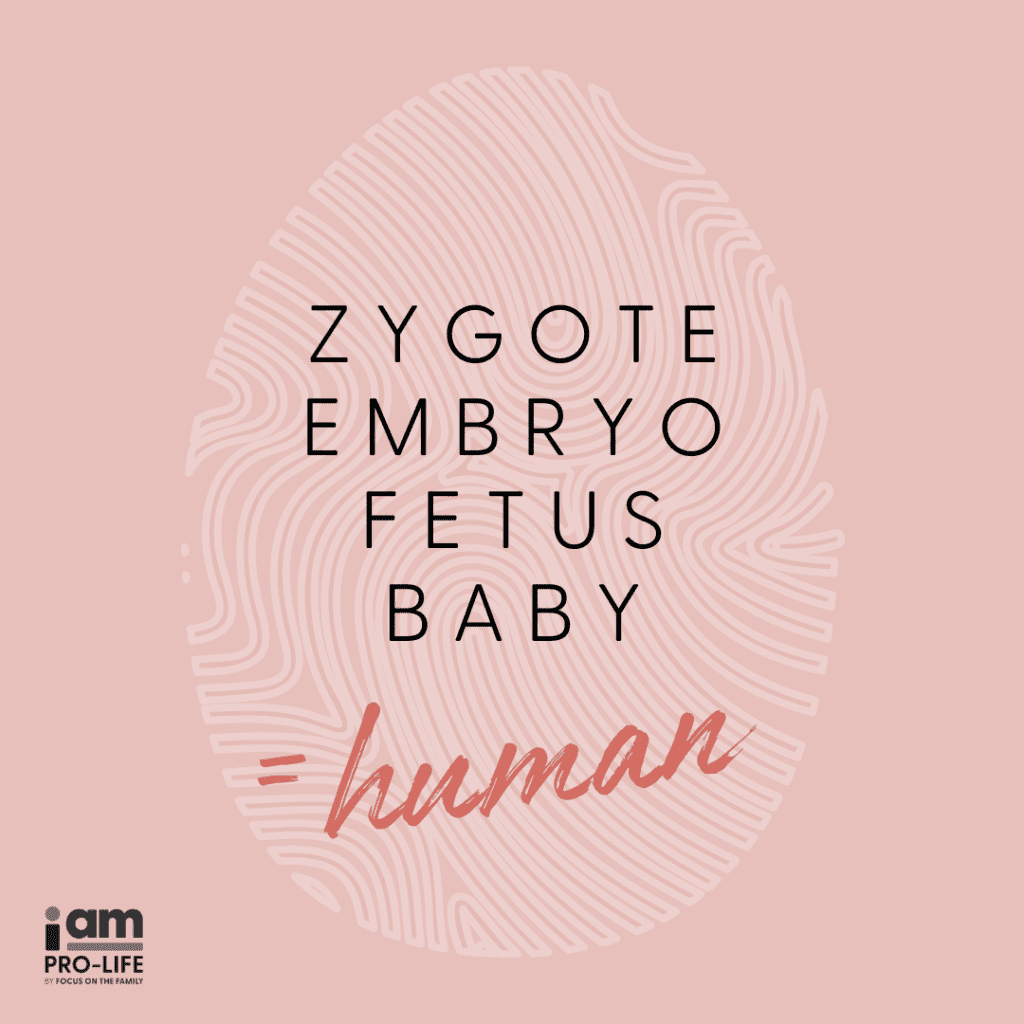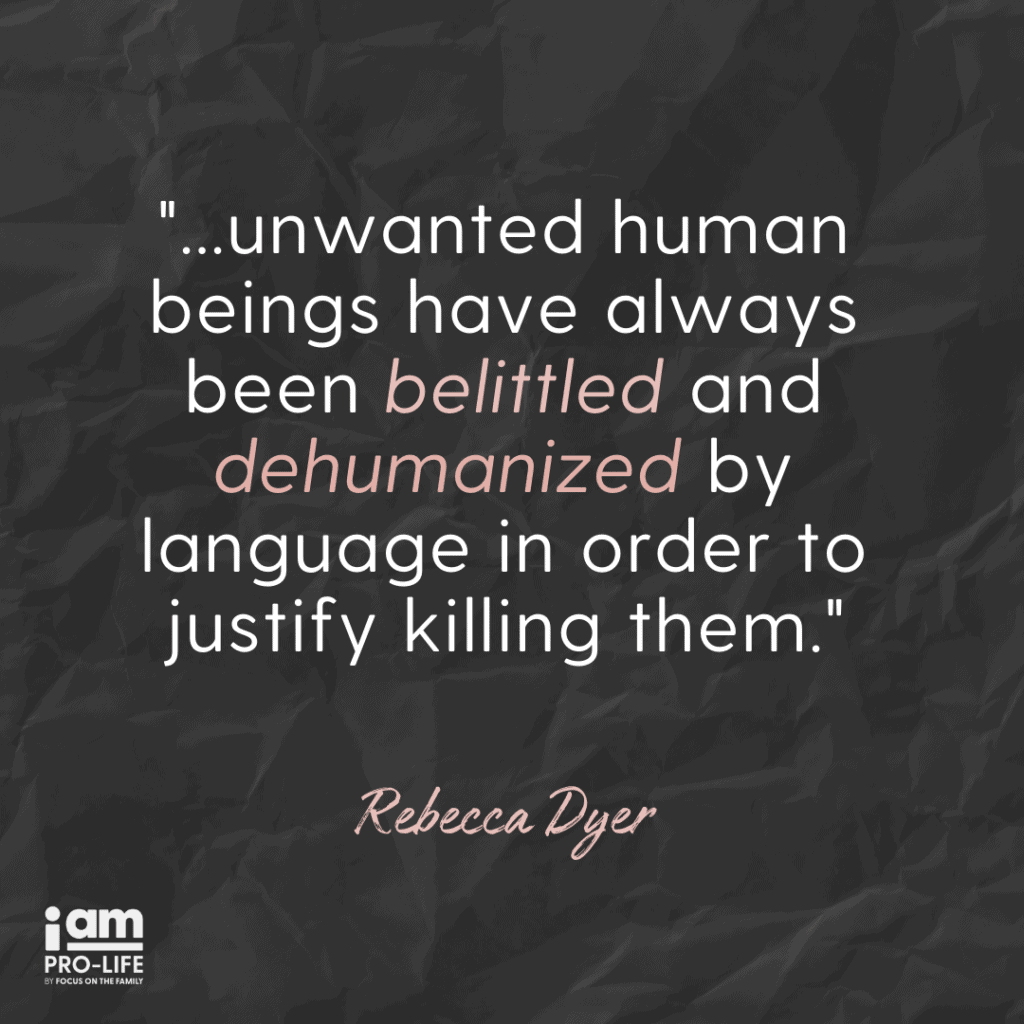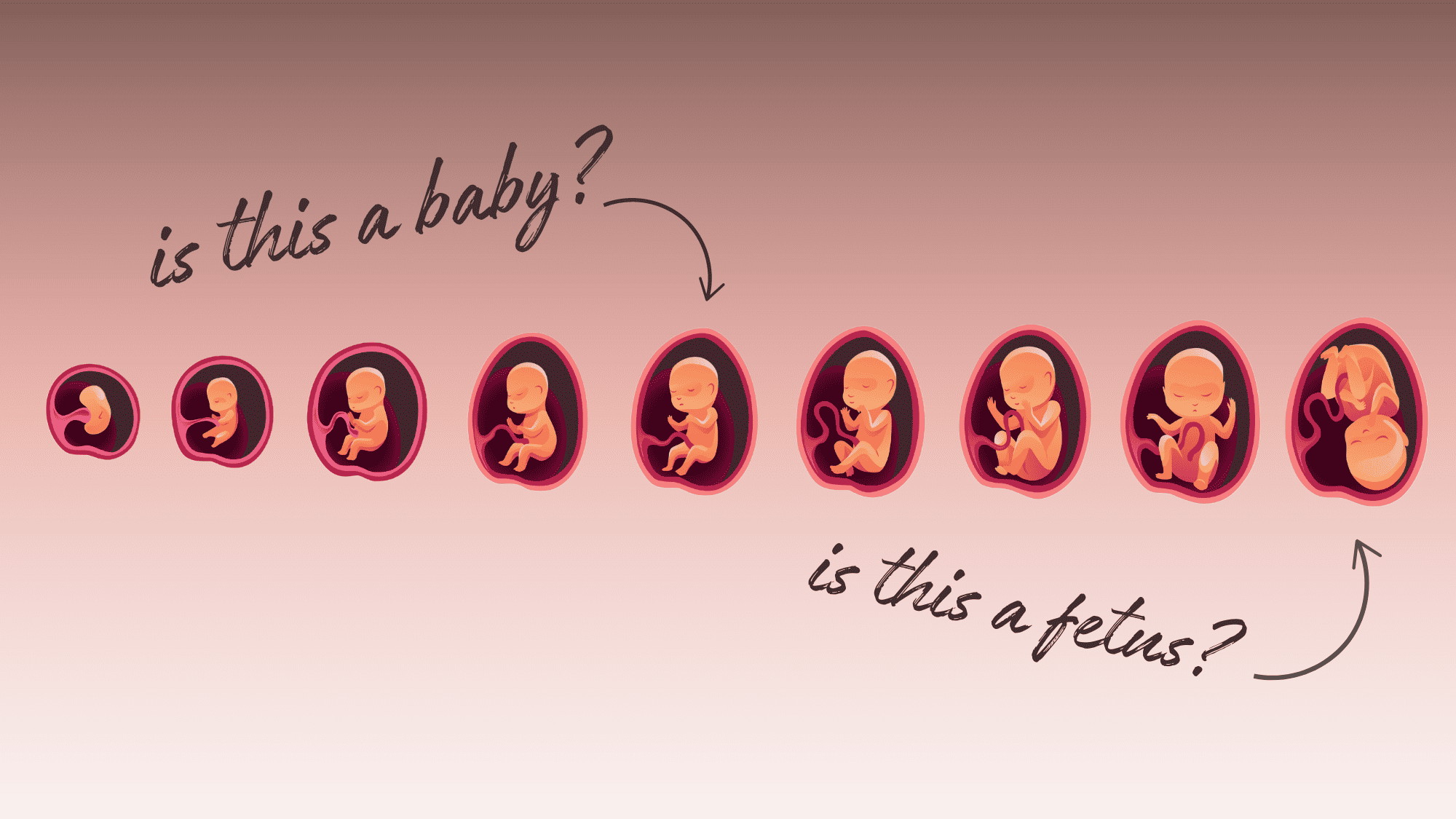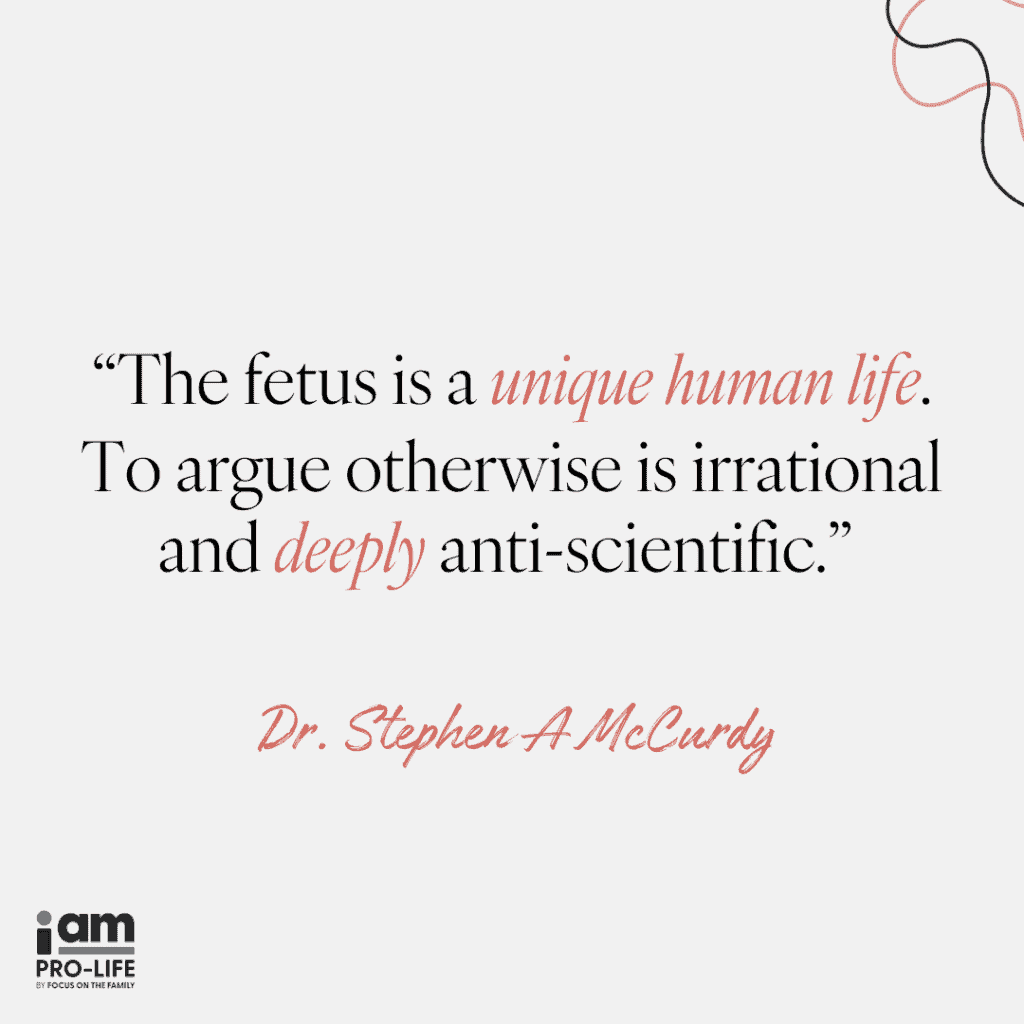I was watching a movie the other day, Twilight: Breaking Dawn Part 1. Admittedly, this movie is not based on real life or the most family-friendly since it is a story of vampires and werewolves. However, my ears perked up when the main character, Bella, found herself pregnant, and there was an ongoing debate about whether she should carry out the pregnancy or end it. As the two sides debated about life in the womb, the interesting twist was the argument about what term to use. Those who wanted to terminate the pregnancy insisted on calling the child a fetus. However, the ones on the other side of the debate insisted on using the term baby.
Fiction often reflects parts of reality that we are trying to work out. So, what is the proper term: fetus or baby? When does a fetus become a baby? And why does it matter?
Is a Fetus a Baby?
Let’s review the reproductive cycle. When a sperm and egg come together, they form a single cell called a zygote. The result is a tiny new cell, smaller than a grain of salt, which contains all the genetic information for every detail of the newly-created life. Now, the new cell, called an embryo, travels down the fallopian tube, multiplying at a fantastic rate and arrives at the uterus around day three or four of being created.
Is an Embryo a Baby?
The embryo implants in the uterus lining and receives nourishment–approximately four weeks into the pregnancy. Many things grow during this time, including a heartbeat, signs of brain development, eyes, arms and leg buds, circulatory system, lungs, fingers, toes and even taste buds all develop during this time—all the systems of a human.
Fetus Definition
According to the Oxford Language Dictionary, a fetus is “The offspring of a human or other animal during its development within the uterus or egg.
Embryo Definition
Also, according to the Oxford Language Dictionary, The embryo is “The unborn human offspring, esp. during the early stages of development.”
Additional Resources:
- Endoscopic video of human embryos
- Fetal Development Stages of Growth
- The First Nine Months
- The Voyage of Life
- Scientific View of When Life Begins
- Science vs. Bible: When Does Life Begin?
Does Fetus Mean Baby in Latin?
During weeks 9-12, the embryo has all the major organ systems and is a distinctly recognizable human being. They are now called a fetus. Fetus is a Latin word for “young one.” The fetal stage of development lasts until birth. During this stage, the fetus can move their limbs. The sex organs are developed, and fingernails, hair and eyelashes grow during this time.
Dennis Michael Manning explains more about the use of the word fetus in the National Library of Medicine, “In college biology laboratory, our task was the dissection of an animal cadaver. We learned the precise terminology: fetal pig. There was no other term for this honorable neo-pig that never uttered an oink—yet whose internal organs revealed the three-dimensional marvels of heart, lungs, liver, and kidneys. Each specimen was not called ‘pig’ as it was <1 percent the size of an adult pig. It was not called ‘fetus,’ as that would be a far too generic term. Fetal what? Fetal gerbil?”
Manning continues, “Applied to humans, the non-specific term fetus conjures vague thoughts regarding the in utero conceptus as somehow pluripotent. The truth is quite different. A fetal human is not only species-specific but also highly specified and one-of-a-kind. Such is an incubating human-being-in-development.” So, yes, a fetus does refer to a baby. However, to be more precise, we are talking about a fetal human, a human in process.
When Does the Fetus Become a Baby?
The fetus is called a fetus through the rest of pregnancy until it becomes a neonate or newborn at birth. People ask when the fetus becomes a baby. However, the question to ask is, what are we trying to determine by asking if the fetus is a baby? Are we asking if the fetus is alive? Or are we asking if the fetus is human? Could it be that we are just trying to figure out what stage of growth the fetus is at?
The word fetus is technically a stage of development of a baby mammal. For humans, once the sperm and egg come together, they create a “genetically distinct human organism.” The human fetus is distinct from the mother and father. An embryo develops and grows, but they are already human. A fetus is alive, as evidenced by its growth and independent movement. It is not pregnancy tissue. Therefore, this stage for the growing human is called the Fetal stage, and the human is called a fetus.
Is a Fetus a Parasite?
Part of the argument about fetuses being non-human is that they are considered by some a parasite on their mother. The argument goes that a fetus is not a human because they “feed” off the mother. This argument is unscientific and misunderstands symbiosis. In symbiosis, there are five types of relationships. The parasitic relationship takes advantage of the host (usually a different species), draining the host of their nutrients without giving anything back (think fleas and mosquitos).
However, that does not describe the mother-fetus relationship, which is more of a mutualism relationship (like bees who gather the nectar from flowers and then pollinate the next flower). There are benefits to both parties. Pregnancy is a “cooperative interaction” between the mother and the baby. The mother can receive health benefits from the child. For example, fetal cells are known to travel to sites of damage or injury in the mother. The mother’s body is created to handle a pregnancy well.
When is a Fetus Considered a Baby?

We have seen from the other points that a fetus is considered a baby when people call it a baby. That is why words are so important. Even though a human fetus is at a stage of development like a human toddler or human adult, many people use the word fetus to make the child sound less human. The fetus or baby meets all the standards of an alive human, “an organismic state characterized by capacity for metabolism, growth, reaction to stimuli and reproduction.”
Is an Embryo a Child?
To determine if an embryo is a baby we should look to see if an embryo is alive. What are the signs of life that we already discussed? We look for metabolism, growth, reaction and reproduction.
Is an Embryo Alive?
After fertilization, the tiny bundle of cells turns into a blastocyst where cell division takes place. From the egg and sperm, we now have a unique entity with 200-300 cells. The neural brain tube and heart tube are formed. The heart beats at 110 times a minute and can be detected by a vaginal ultrasound. The embryo has developed the beginnings of genitals. The umbilical cord forms and helps transport oxygen in blood to the embryo. The preborn is processing nutrition and begins to grow. Does this meet the requirements of being alive? Yes!
Are Embryos Babies?
There is no magical birth canal that moves a preborn from being a non-human, non-alive entity to human and alive. Even as a tiny embryo, they have 23 pairs of distinctly human chromosomes. This makes up the human DNA. Also, some people are adopting “snowflake babies.” These are frozen embryos created through in-vitro fertilization. This would indicate that, yes, embryos are babies.
As Harvard University Medical School professor Micheline Matthews-Ross testified before a 1981 U.S. Senate Judiciary Committee, “It is scientifically correct to say that an individual human life begins at conception … and that this developing human always is a member of our species in all stages of life” (New York Times, April 26, 1981)
Is a Fetus Viable?
Some hospitals work to save premature babies with great success at 21-22 weeks. There have been several advances in healthcare. For example, in 1974, there were 16 physicians certified in maternal-fetal medicine (medical care for babies in the womb). Now there are over 2,200 specialists who provide in-utero fetal care and surgery. In addition, look at the Perinatal Quality Foundation, a large organization dedicated to the care of fetuses. “The strength of the PQF (Perinatal Quality Foundation) is its ability to bring together experts, thinkers, and leaders devoted to maternal and fetal health to reflect on, select, and implement programs to facilitate quality perinatal patient care.”
“Today, we have an unobstructed view inside the womb of the developing unborn child, which not only unveils the humanity of every life but allows physicians to diagnose conditions and manage life-saving care with greater precision and confidence. Birth defects once considered life-threatening, and debilitating are now identified much earlier in gestation, and many can be corrected via in utero surgery at major medical institutions throughout the United States. Such innovations have resulted in increased fetal survival, improved quality of life, and a significant reduction in the standard age of viability.”
Tara Sander, Ph.D and Mia Steupert, M.A.
When is a Fetus Considered a Baby Scientifically?
There are three scientific stages for the development of a baby.
Gernimal stage
The Germinal Stage is the shortest of them all and begins at conception and goes until the zygote implants into the uterus.
Embryo Stage
Once the zygote is implanted, the second stage begins, which is called the Embryonic Stage. This stage is from about the third week of pregnancy to the eighth week of pregnancy. Some people ask, “Is an embryo alive?” Judge for yourself. At the Embryonic Stage, there is a heartbeat, brain activity, organs, head, eyes, mouth and limbs. Doesn’t that sound human and alive?
Fetal Stage
Finally, the Fetal Stage is from nine weeks until the birth, around 40 weeks of pregnancy. When the baby is born, they are considered a neonate or newborn baby. Scientifically, a baby is not labeled a baby until after being born. The terms zygote, embryo or fetus are used scientifically to identify the stages of the pregnancy. Calling a baby a zygote or an embryo or fetus does not make it less human; it only classifies the growth stage.
When is a Fetus a Baby Legally?
There is no specific law that details when a fetus is considered a baby and has human rights. That is part of our problem. However, there are some things to consider. The murder of a pregnant woman is considered in some states a double homicide.
For example, look at the murder of Lacie Peterson. In addition, a British nurse was recently sentenced to life in prison for killing seven babies in the neonatal care unit. (The babies were born prematurely and could still have been in the womb at their death.)
In addition, chemicals in our society can adversely affect the embryo. Some states have rules against mothers drinking alcohol. Why would anyone care about what pregnant women consume if it didn’t affect a human? Finally, the United States President George W. Bush signed the Unborn Victims of Violence Act into law in 2004. A violent crime that kills the mother and fetus she carries is considered a crime against two people. And eleven countries specifically give rights to the preborn.
When Does a Fetus Become a Person?

So is a fetus a baby? Yes. The fetus is a baby and, therefore, a person. The term fetus is a stage of the baby’s growth. However, as described in the Twighlit movie previously, some people preferred to use the word fetus instead of baby to distance themselves from the life growing in the womb. Semantics matter.
Writer Rebekah Dyer explains why. “When you look back on history, unwanted human beings have always been belittled and dehumanized by language in order to justify killing them. In Germany, a certain group of people were not considered human; they were Jews. African Americans were not ‘persons’ because of their skin color. In Rwanda, the Tutsis were not fellow countrymen to the Hutus; they were ‘cockroaches.”
Human history, unfortunately, shows the human race’s sad history of overlooking the voiceless or marginalized for the benefit of the powerful. Yet, thankfully, someone stands up and says, “This is not right.” A fetus is a baby with a mother and father. Can we support all three even when they are brought together unexpectedly? We can, and we must. Let’s not forget the failure of our past to realize that people are people. A human is a human, and calling it anything else in order to marginalize its value is wrong.



















